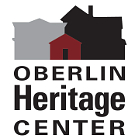Science Benchmarks addressed on tours
Key: Oberlin Heritage Center Tour (OHC), Freedom's Friends History Walk (FF), Scholars & Settlers / Tappan Sqaure History Walk (T), Radicals and Reformers History Walk (RR), I Spy Scavenger Hunt Tour (IS), Lessons in the Past (LP)
Kindergarten through Second grade
Notes in italics explain how tours meet these benchmarks.
Science and Technology
A. Explain why people, when building or making something, need to determine what it will be made of, how it will affect other people and the environment. (OHC, T, IS)
B. Explain that to construct something requires planning, communication, problem solving and tools. (OHC, T, IS)
Students will be able to explain the concerns people had when building and making discoveries in Oberlin's earliest years.
Scientific Ways of Knowing
A. Recognize that there are different ways to carry out scientific investigations. Realize that investigations can be repeated under the same conditions with similar results and may have different explanations. (OHC, T, IS)
Students will learn that Charles Martin Hall, with his sister’s assistance, figured out how to mass produce aluminum. They will learn how he used trial and error and eventually repeated the process to prove its validity.
Third through Fifth grade
Science and Technology
A. Describe how technology affects human life. (OHC, FF, T, IS, LP)
Students will be able to describe how various technology has affected our lives by viewing historic items that were the predecessors to what we use today.
Scientific Ways of Knowing
B. Describe different types of investigations and use results and data from investigations to provide the evidence to support explanations and conclusions. (OHC)
D. Explain that men and women of diverse countries and cultures participate in careers in all fields of science. (OHC)
Students will learn that Charles Martin Hall, with his sister’s assistance, figured out how to mass produce aluminum. They will learn how he used trial and error and eventually repeated the process to prove its validity and how it has helped shape our daily lives.
Sixth through Eighth grade
A. Give examples of how technological advances, influenced by scientific knowledge, affect the quality of life. (OHC, T, LP, IS)
Students will learn the discovery of aluminum and the technological processes and trials involved with creating it on a commercial scale. They will analyze various ways that this discovery has improved our quality of life and ways that it will affect the future of life on Earth.
Scientific Ways of Knowing
C. Give examples of how thinking scientifically is helpful in daily life. (OHC, T)
Students will be able to give examples of ways that the Jewetts scientifically viewed ways to improve the quality of daily life.
Ninth through Tenth
Science and Technology
A. Explain the ways in which the processes of technological design respond to the needs of society. (OHC, T)
B. Explain that science and technology are interdependent; each drives the other. (OHC)
Students will learn how the commerical production of aluminum and the trials involved were driven by societal needs.
Scientific Ways of Knowing
B. Explain how scientific inquiry is guided by knowledge, observations, ideas and questions. (OHC)
Students will learn that Charles Martin Hall, with his sister’s assistance, figured out how to mass produce aluminum. They will learn how he repeated the process to prove its validity with continuous observations, ideas, and questioning.
Eleventh through Twelfth grade
Science and Technology
A. Predict how human choices today will determine the quality and quantity of life on Earth. (OHC, T)
Students will learn about the City Beautiful movement and Progressive Era, and how decisions made by people in the past led to preservation of green spaces and protection of the environment today.
Scientific Ways of Knowing
A. Explain how scientific evidence is used to develop and revise scientific predictions, ideas or theories. (OHC)
C. Explain how societal issues and considerations affect the progress of science and technology. (OHC, T)
Students will examine the process that Charles Martin Hall used to extract aluminum. They will learn how he repeated the process to prove its validity and how it has helped shape our daily lives. They will see historical objects and be able to observe changes in technology that were intended to improve life and make work easier.




